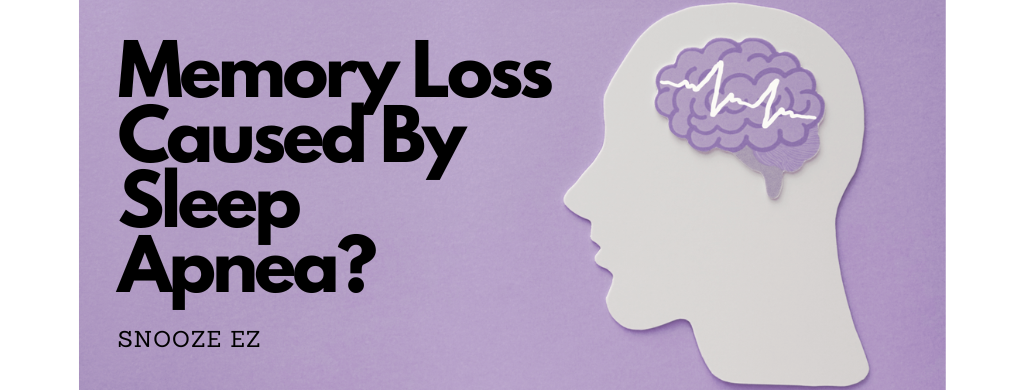Yes, sleep apnea can cause memory loss and changes to your brain shape.
Do you find yourself struggling to remember information or feeling constantly fatigued during the day? If so, you may have sleep apnea. Sleep apnea is a potentially deadly sleep disorder when breathing is interrupted briefly multiple times during a night of sleep.
Sleep problems can take their toll on your daily life, ranging from reduced productivity at work to deterioration of your mental health in the long run.
Many people don’t even know they experience problems with their sleep quality until it starts affecting their lives significantly.
One such issue can be memorizing new information and recalling it when needed, leading some to believe that something is wrong with their memory.
But how does impaired sleeping also cause memory problems? Research has shown that there may be a link between sleep apnea and memory impairments, which often manifest in poorer word recall and longer reaction times.
In this article we will look at how lack of sleep, because of sleep apnea specifically, can cause memory problems.
How does sleep apnea affect the brain?
When left untreated, sleep apnea can lead to memory loss and other cognitive issues due to changes in brain matter and damage to neurons.
Recent studies have also shown that sleep apnea alters the levels of neurotransmitters in the brain, but this damage may be reversible with treatment.
In addition to physical side effects such as high blood pressure, heart disease, and diabetes, sleep deprivation caused by sleep apnea can interfere with the brain’s ability to consolidate memories.
This can lead to difficulty thinking clearly and solving problems. Lack of sleep can also cause depression due to difficulty recalling details from the past.
Can sleep apnea cause memory problems?
Untreated sleep apnea can lead to memory loss. A study found that those with OSA struggle more to form semantic memories than those without, due to sleep fragmentation interfering with the sleep cycle.
Sleep apnea can interfere with the memory consolidation process, leading to difficulty in recalling memories. Further research is needed to explore if OSA leads to both depression and memory problems, or if they affect memory consolidation independently.
People with severe, untreated sleep apnea have significant damage in multiple areas of the brain. Those with sleep apnea experience problems with immediate recall, delayed recall, learning and recognition.
A 2017 study published by the American Academy of Sleep Medicine found that 2294 adults with untreated OSA had poorer cognitive performance than 1364 healthy adults.
This evidence suggests that sleep apnea can lead to memory loss and further research should be conducted into this area in order to better understand how it affects our cognitive abilities.
How sleep apnea changes your brain shape?
Sleep apnea is a serious sleep disorder that can have far-reaching consequences on the body, including the physical shape of your brain.
Studies have shown that sleep apnea can cause physical, measurable changes in the brain, such as a decrease in the size of the mammillary bodies and reductions in gray and white matter.
These changes can lead to poor memory, emotional problems, decreased cognitive functioning and increased cardiovascular disturbances.
A 2008 UCLA study found significant damage in the brain’s fiber pathways and structural alterations in its white matter.
This damage was linked to an increase in daytime sleepiness and fatigue due to lack of oxygen during episodes of sleep apnea.
The study also showed that these changes could be reversed with proper treatment for sleep apnea.
How sleep apnea changes brain function?
A study by the UCLA School of Nursing published in the Journal of Sleep Research investigated the injury caused to the insular cortex of the brain by sleep apnea.
The study found substantial differences in two important neurotransmitters, glutamate and gamma-aminobutyric acid (GABA). These changes indicate a reorganization of how the brain is working due to sleep apnea.
The findings from this study suggest that sleep apnea can cause changes in the brain, which can lead to symptoms such as stress, concentration and memory loss.
Can the brain be restored from damage?
Sleep apnea is a serious condition that can cause damage to the brain. It is linked to changes, and even the shape, of the brain, and treating it with CPAP therapy may restore brain chemicals to normal levels.
Studies have found that CPAP treatment can almost completely restore white matter after a year of use, and gray matter after three months.
Improvements were seen in cognitive tests, mood, alertness and quality of life. The benefits of CPAP therapy include a restful night’s sleep without having to take any medication.
Restoring damage to the brain is possible through treatments such as medication and lifestyle changes.
Talk to your doctor if you or a loved one are experiencing symptoms of sleep apnea, and consider scheduling a sleep study for further evaluation.
Sleep apnea can have serious consequences on overall health, including heart and diabetes-related issues. With proper treatment, however, it is possible to reverse some of the damage caused by this condition.
Conclusion
In conclusion, sleep apnea can cause memory problems due to the damage it causes to the brain. Studies have shown that this damage can be reversed with proper treatment such as CPAP therapy.
It is important for those suffering from sleep apnea to seek medical help and get proper treatment so they can avoid any long-term damage to their brain.
With the right treatment, it is possible to reverse and restore some of the damage caused by sleep apnea.


